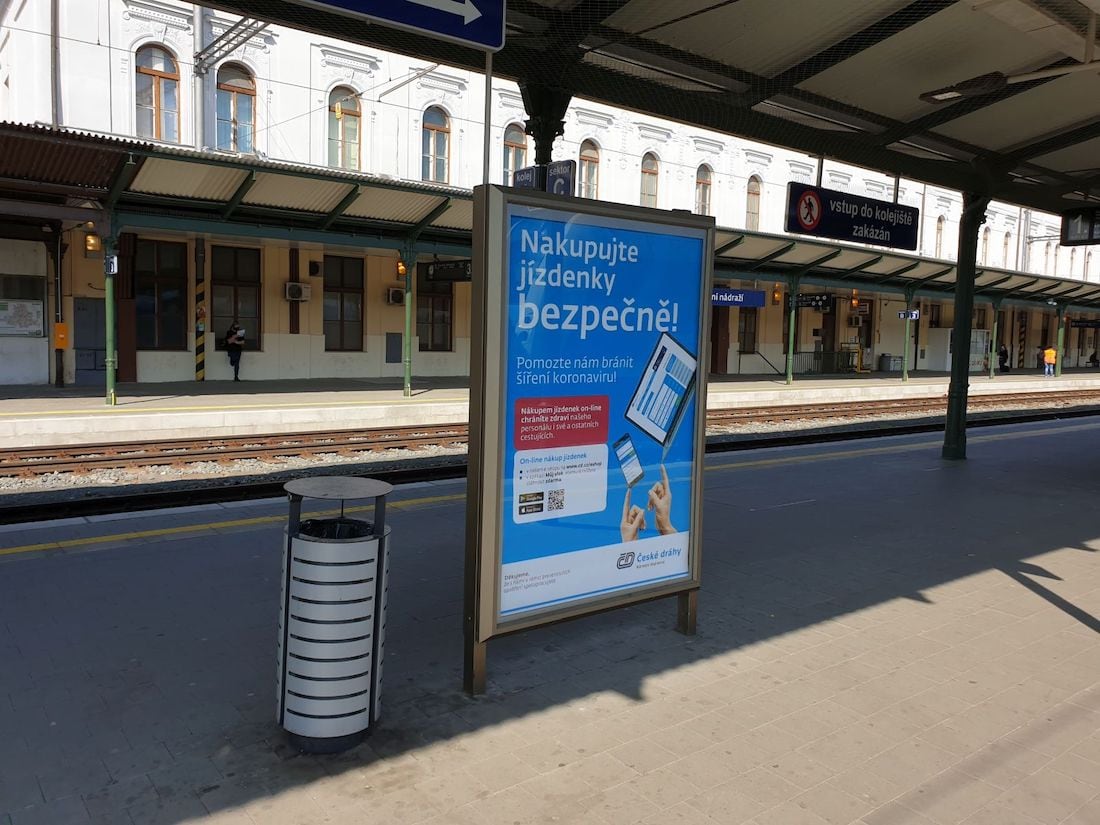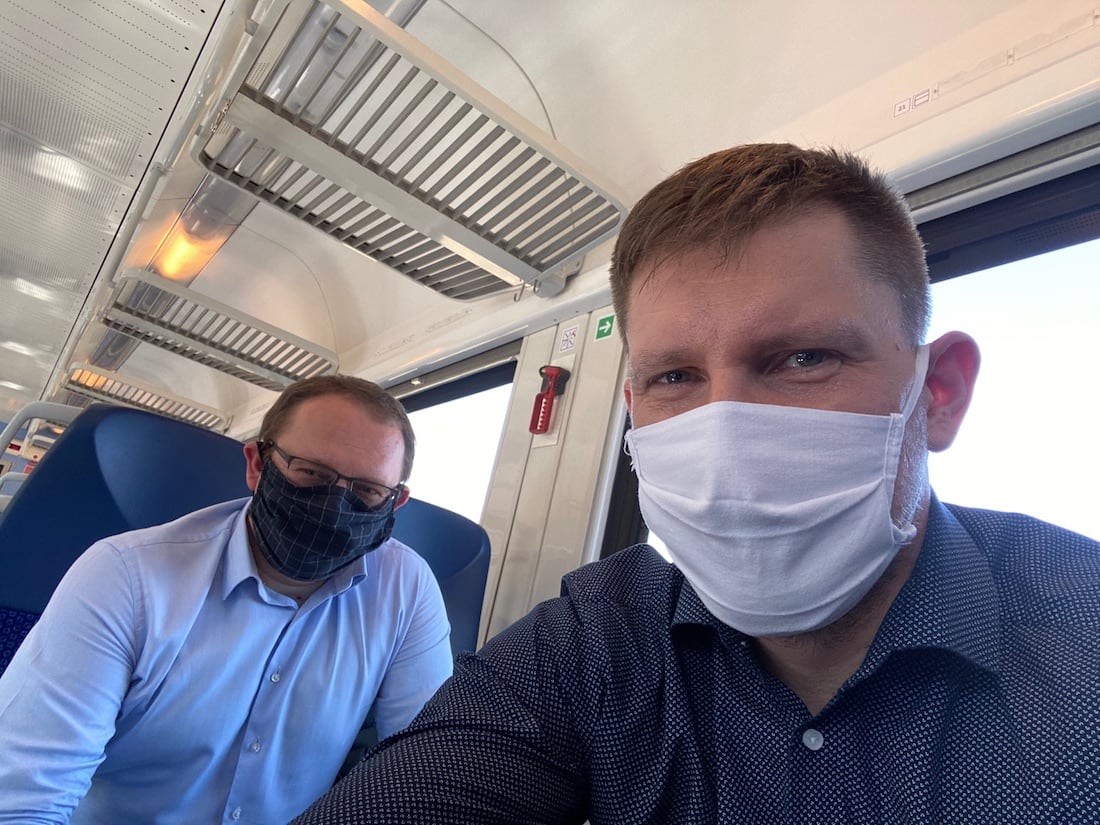The spread of covid-19 has affected many businesses across the country. Without a delay, the biggest Czech carrier Czech Railways had to change many things from one day to another. How big the changes have been and how the company has managed to cope with them were the questions for the CEO of ČD Václav Nebeský.
In what mode are Czech Railways operating now?
The management of the company is very operational at this time and requires a much higher work commitment from everyone. Although the number of services has been reduced significantly, we are still a network carrier and operate more than 4,500 trains every day. Thousands of our operation employees are at work.
Crisis management in such a huge company must be quite demanding. How does it work?
Twice a day we have a crisis staff meeting of the parent Czech Railways and we also communicate at the level of the ČD Group. The vast majority of negotiations are done via teleconferences. This way we deal with operational and safety measures, purchase of disinfectants, protective equipment for people in operation, reduction of connections and personal belongings. There are many topics to be talked. We are in contact all day long, of course, including weekends. Otherwise it simply wouldn’t work. In addition, we communicate with the Supervisory Board, ministries, regions, health station and other organizations.

What are the main measures you have taken as management?
From the beginning we have been doing our best to protect our employees and customers. From one day to another, we began thoroughly disinfecting cars using modern methods such as ozonisation. We’ve bought disinfectants and protective equipment for our staff. We do not only have disinfectants in our facilities; as far as protective equipment is concerned, it was a much bigger task. It is necessary to realize that there are almost 15 thousand employees on ČD alone and most of them are in operation, moreover, in multi-shift operation. Securing gloves, goggles, masks and disinfectants in such quantities was not easy at all. At the same time, we have reduced the number of counters and cashiers, but we did it in a way that maintains sales at all cash registers separating the staff and customers by glass. The next logical step was to introduce only visual ticket checking and temporary stopping of ticket sales by train conductors. And then many other, especially operational measures have been adopted, such as changing the circulation of vehicles and trains, increased dispatching and dealing with relatively unpleasant situations, which usually resulted in the exit of integrated emergency services for sick passengers and subsequent thorough disinfection of the vehicles.
How did you manage the acute lack of protective equipment at the outset?
When coronavirus appeared in Czechia, no one at all, even medical staff, had sufficient supplies. There was a struggle for respirators and masks. The excess demand drove prices up tenfold. A lot of traffickers got involved; so the situation was pretty confusing. Deliveries of masks came late and even in a smaller number than we’d ordered. Fortunately, we have never relied on just one source, and we managed to do a lot ourselves. I mean employees and their families, who managed to sew the masks. The same was the case with disinfectants, but timely orders since the beginning of epidemic outbreak and very good supplier relationships helped a lot.
And thanks to that you could afford to resume selling tickets on trains?
Yes. We temporarily stopped the sale of travel documents to minimize our employees' contact with customers. At the moment everyone is equipped with protective equipment, including FFP2 respirators in case they encounter an obviously ill person. We agreed with our transport partners that it is necessary to slowly return to normal because some people do not respect the rules, refuse to buy tickets, destroy the interior of trains and so on. I see it myself when I go on inspection trips by train.

How many infected employees do ČD have?
The situation naturally changes over time. The entire ČD Group employs more than 23,000 people, so far there have been only units of confirmed cases. Tens of people are in preventive quarantine, hundreds are working from home and hundreds are on so-called ‘obstacles’.
What are the current biggest problems you are addressing?
The biggest problem is, of course, money, but here the biggest fight is yet to come. Practically, a large part of the transport market was “frozen ” from one day to the next, and so, of course, our sales plummeted. People travel significantly less, but we can't stop the traffic. In short, we must operate according to our contractual obligations. Moreover, this regime is part of government measures to ensure that the economy does not come to a complete halt, while avoiding the aggregation of more people, in our case passengers, in one place. Therefore, we do make trains shorter across the board, and do not remove cars from trains, even though some connections have temporarily disappeared from the timetables. However, we have transformed some problems into opportunities, for example, we are now repairing our vehicles more.
What will the after “corona” state be like?
As already mentioned, a several-week loss of sales will significantly affect the economy, which in our case will be billions of crowns. However, we are doing our utmost to ensure that this failure does not translate into a reduction in planned investments or a reduction in the number of operation personnel. It remains a question of how long it'll take for the world to return to its tracks, until then it will be about the daily balancing of our performance on the one hand and reduced returns on the other. Anyway, the post-corona situation will be characterized by compensation and support, stabilization, and hopefully development. A company of our size will certainly use the opportunity for some interesting acquisition. Personally, I think that the state of the economy and society after coronavirus will not be the same as it was a few weeks ago. We have to count on that.
Václav Nebeský (born on 31st October, 1977) is the CEO and Chairman of the Board of Directors of České dráhy.
He graduated from the Secondary Technical School of Transport in Prague and later got his bachelor's degree in Transport Management, Marketing anL logistics at the Jan Perner Schoo of Transport at of the University of Pardubice.
From 1996 to 2000 he worked at České dráhy as a train dispatcher, then until 2005 as a technologist and system specialist. Later he also worked at a subsidiary of the ČD - Telematika Group and ČD Information Systems. From 2009 to 2014, he was the Director and Managing Director of RPP International, and since 2011 he was the owner and statutory director of VISEFI for seven years. In December 2017 he became Political Deputy Minister for Regional Development Klára Dostálová. He held the post until autumn 2019. On 25th September 2019, the Supervisory Board elected him the CEO and Chairman of the Board of Directors of ČD.
He is married and lives in Prague with his wife Olga.